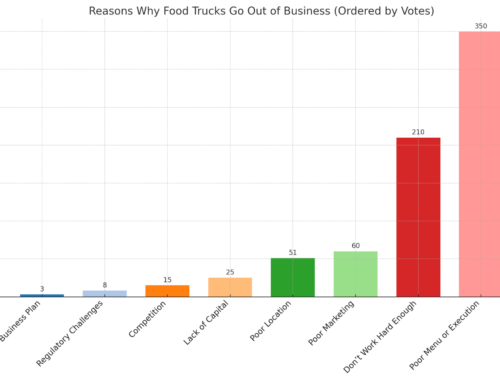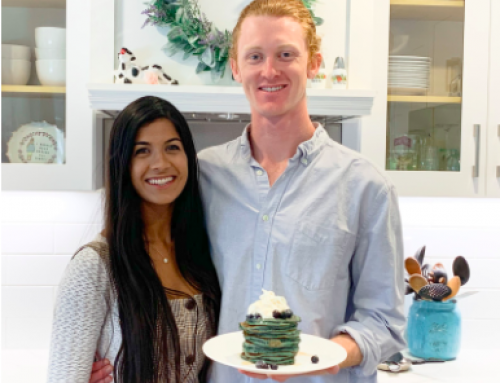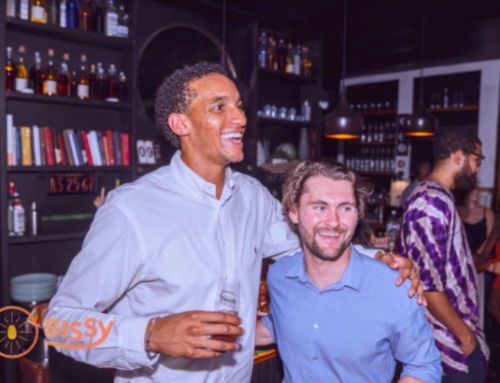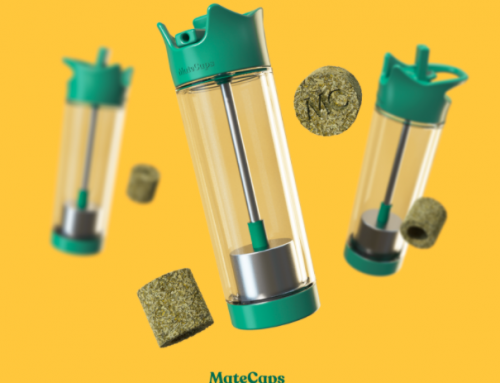Hello! Who are you and what food business did you start?
My name’s Julia Devecchi and I’m the Founder of HappyBites! HappyBites creates vegan (and coincidentally gluten-free) cookies that contain your daily needs of vitamins and minerals. Our main customers are vegans, sometimes also vegetarians and gluten-free people. I had the idea for HappyBites earlier this year in April, launched the first version of the Product in July and are now (October) making monthly recurring revenue.

Of course, I strongly believed in what Reid Hoffman, Co-Founder of LinkedIn said: “If you’re not embarrassed by the first version of your product, you’ve launched too late”. Looking back, those first Chocolate Chip Cookies we sent out to our first customers really weren’t that great, and we still have a lot of work to do.
What do your sales look like to date?
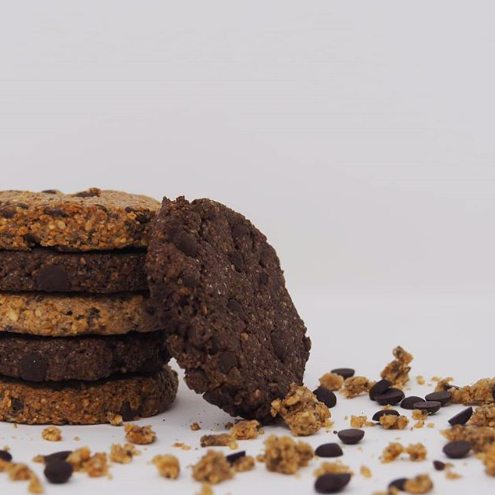
We only launched our product at the end of July, and made our first few sales to people we know. It’s great having the support of family and friends, but there’s a book called The Mom Test which is highly recommended in the startup world for testing out your ideas, and making sure it’s not just your family being nice telling you you’re a smart cookie!
We made a loss of a few thousand of dollars from May – July. Then in August finally made a little Revenue through our website, before selling at two major vegan events in September in Switzerland and then getting our first product subscribers in October!
What’s your backstory and how did you come up with the idea?

2-3 years ago I went to my first Startup Weekend, which is a great place to experience validating business ideas over 50 crazy hours. I pitched something completely differently back then, but the experience itself amazed me to such an extent that I couldn’t ever really think of doing something that wasn’t startup related.
When I became vegan I was overwhelmed by the amounts of supplements I was supposed to take and at the same time there were only few sweet vegan things that exist which don’t contain palm oil and/ or are wrapped in plastic packaging and still taste good!
Related Reading: How a Culinary Grad Built a $26K/Month Pastry Shop
Fast forward to this year and I found myself re-enrolled in the Founder Institute by accident (we wrote a blog about how that happened on our website). This is when the idea first came to mind. I thought there must be a way of a) getting all nutrients from natural and vegan sources and b) being able to enjoy taking supplements!
Founder Institute pushes one to make immense amounts of progress every week. There was barely a time I felt we weren’t moving fast enough.
After the program I made sure that we continue moving as quickly every week. I think some things take others a long time to do, because they have a big thought process around different items (idea, discussion, analysis, options and execution).
I personally often went from “we need to do this” to “lets do it” and done in a matter of minutes, hours, days. In my cohort I’ve several times been described as, “oh yeah, Julia, she just DOES IT”. I don’t generally quote other brands, but follow Nike and ‘just do it’!
Before that I had finished my Bachelor’s in Business & Entrepreneurship (a thing I believe can’t be studied in academia), quit Tesla after 3 months and got fired from a company that called itself a startup. So, I was in the perfect position to start my own startup – if not now, then when?
Take us through the process creating your first batch of healthy cookies.
The very first version of HappyBites was me baking Chocolate Chip Cookies based on a non-vegan recipe, replacing all eggs and dairy ingredients with alternative vegan options. Then breaking open pills and adding them into the cookie mix! Our first version of cookies looked green-ish and tasted exactly how a first version should taste – not that great.
These are some photos of our failed attempts:
Our unique value proposition is our secret recipe, meaning we can’t have a manufacturer produce our product, otherwise we’d be giving away our secret recipe.
In the mean time, I’ve found a co-founder who’s a nutritionist, so we very quickly went from version 1 to version 35. We improved as much as we could in the recipe, reducing the sugar, improving the flavor, replacing ingredients and improving the process to increase our key nutrients.
Describe the process of launching the HappyBites.
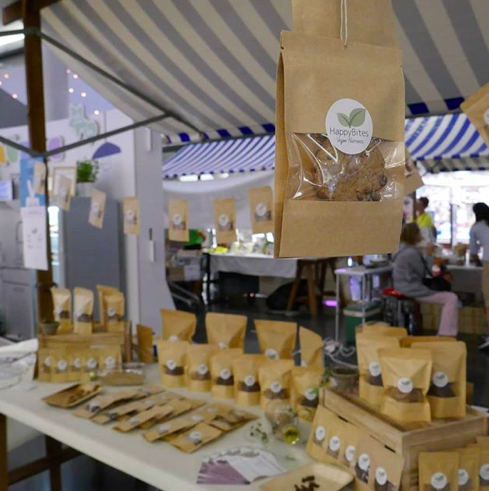
Always dive into the network of people you have, you’ll be surprised to find most of the people you need from the people you already know. I knew a Full-Stack Developer from my previous job, he became our CTO and coded our website. Other team members we found through personal networks, LinkedIn and startup/ food related events.
I’ve been incredibly fortunate to find people that will work without pay in the initial phase. On the one hand we have educated people who have just graduated and are highly knowledgable, but have no work experience yet. While we can’t offer them pay, we can offer them a first work experience.
This in itself brings some challenges, but the positives far outweigh the negatives. On the other hand, if you have a vision/ mission that others can align with, people will often follow a “leader” or a cause they believe in. Especially in a startup, people will go above and beyond to work towards what they believe in rather than pay. Of course, you can’t offer nothing. We try to cover basic costs for everyone and of course offer a certain amount of equity to the key team members.
I personally have been funding our startup, we are considering a Kickstarter campaign, but have only started the planning process today and expect to take about 6 months to properly plan our crowdfunding campaign. There’s a really good video on the top 3% of Crowdfunding campaigns that have been analyzed.
We are currently figuring out how to grow and are looking at different Growth Hacking Strategies. What I recently heard from someone is not to throw money at growth but instead be courageous about crazy ideas.
The best lesson learnt to get started is to just attempt everything. Even if you believe something might fail or not quite work out how you imagine, just try it anyways. We are going to much more aggressively just attempt all the crazy things that we can. If you don’t try, you won’t know if it will work!
Since launch, what has worked to attract and retain customers?

At the beginning we tested FB ads and instagram ads with basically 0 return. For $40 we once had one newsletter signup, but that was about it. I think people are so used to seeing ads, unless they’re optimized to 100%, ads won’t get you very far.
Of course, upkeep your social media platforms, be on all the platforms that make sense for your customers. Our key platform is instagram, vegans share a lot on instagram and communities there are quite impressive with engagement.
We’ve been directly engaging with our customers through instagram, Ninjalitics has been a really good tool for us to check the engagement rate of our influencers. These instagram profiles have a community of followers that are more engaged and also have a level of trust with the profile they follow. Meaning if we offer our influencers our products to try, their followers are more likely to accept the offered product and approve of the recommendation.
We have been going to many vegan events and expos and offering/ selling our product there. To validate a product or testing different price points, going to expos is a great option, especially as you get to have direct insights from your potential customers and hear what their reasons are for purchasing or not purchasing.
Try finding events that have a low cost of participation where spending under $500 won’t ruin you if the event doesn’t work as expected. Innocent is a great example of validating their business at a festival. They offered their products and asked should we quit our jobs and start this business and had a yes and no bin for empty bottles.
Make sure to also capture your customers contacts at events, we’ve been quite bad at this in the past and are testing new ways to make it easier for our customers to sign up to our newsletter.
How are you doing today and what does the future look like?
We still have lots of testing and iterations to do in our product. Because our product replaces supplements, each time we make a change we need to ensure that a lab test confirms our expectations. We are sending out subscriptions and want to make sure that our customers are getting the best they possibly can.
Just having finished our idea-stage accelerator we’re now considering the best next steps for growth. To be completely honest, we don’t really know what we’re doing. But I think half of being an entrepreneur is pretending to know what you’re doing.
Currently we’re aiming to keep each month at breakeven. As long as we can cover our costs, we’re quite happy. Of course, events are quite easy, but getting subscriptions is quite difficult to do.
What have you learned by starting HappyBites?
Well, you need to get quite used to having to do everything. You might be uncomfortable doing sales, but you’ll have to do it. Maybe you’ve got no clue about design, but the day will come when you need a flyer. At the beginning you try to save costs as much as you can, so you do everything yourself.
I’ve personally never been a person to ask for help, but there’s so much value in asking advice from others. Go to events in the same industry as our business and ask people for advice. There are so many lessons learnt that you can avoid mistakes that people have previously done.
We have two Advisors who have been incredibly valuable so far. One from the food industry and one with startup experience. Having someone with years of experience who you can reach out to for help or just things you’re unsure of can really make you progress faster. Advisors are also probably always more open to offering advice than you think.
What tools do you use to run your business?
I love free tools, and except for our domain and website hosting, all other tools are free. On the business side we use Google Drive for most things! It helps us keep everything in one place. To keep my small team organized we use basecamp, which is now filled up with many to-dos that are assigned to many of us. We were previously using mailchimp for our newsletters to stakeholders and leads, but have since switched to MailerLite because I’ve found it much more user friendly.
I’ve recently come across appsumo, which often offers lifetime deals for a fraction of what the tools would normally cost. We’ve found social marketing management tools, lead gen tools and more through that site for quite cheap.
Hotjar has been an amazing tool to track customer interaction on our website, it shows much better insights than Google Analytics.
What have been the most influential resources?
Honestly, I’m terrible at reading all the useful books that are out there. I’ve got blitzscaling in my bag and carry it around with me every day, but still haven’t read half of it.
The most useful resources I have found is exchanging with other entrepreneurs. There’s nothing better than going to food or startup related events and hearing from other industry professionals and speaking to entrepreneurs. Meetup has been the best place for us to find such events.
Related Reading: How I Started an $1,800/Month Booze-Infused Baking Business
If you want to read startup books, I’d recommend starting with the basics, The Mom Test and the Lean Startup.
While it’s not necessarily food related, I’d highly recommend going to a Startup Weekend. Even though it has a tech-focus, it takes you through all the things you should do for validation and is already a good step to introduce you into pitching your idea/ business.
Advice for other food entrepreneurs?
Definitely just go out and try whatever it is you’re thinking of. Pitch your idea to some people and listen to their feedback. Go to relevant events and exchange with others. Reach out to people in similar industries or people with startup experience and ask for advice. Reach out to me if you like!
Where can we go to learn more?
- Website
- Facebook (plant-based industry news)
- Instagram (Product Updates)
- LinkedIn (Company Updates)
- Newsletter (product updates, special offers & more)

